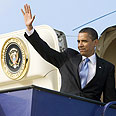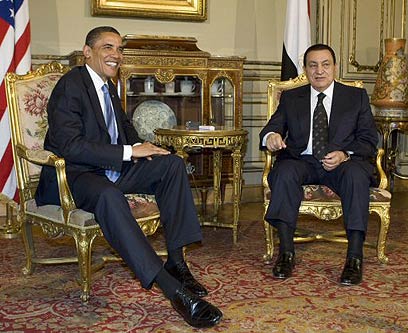
President Barack Obama discussed the quest for Middle East peace and Iran's disputed nuclear ambitions with Egyptian President Hosni Mubarak on Thursday before delivering a dose of "truth-telling" about the often fraught relations between Americans and Muslims.
Aides said Obama's long-promised speech to a vast, electronically linked-in global audience would blend hopeful words about mutual understanding with carefully chosen language on Iraq, Afghanistan and the Israeli-Palestinian standoff, plus blunt talk about the need for Muslims to embrace democracy, women's rights and economic opportunity.
But first, Obama and Mubarak met privately on a range of topics. Chief among them: Iran's suspected efforts to build a nuclear bomb and the long-running conflict between Israel and the Palestinians.

Obama with Mubarak (Photo: Reuters)
In brief remarks, Obama said they spoke about "how we could move forward in a constructive way to bring about peace and prosperity to all people in the region." He said he emphasized that "America is committed to working in partnership with countries of the region so that all people can meet their aspirations."
Mubarak added, "We opened all topics with no reservations."
After spending the night at Saudi King Abdullah's horse farm in the desert outside Riyadh, Obama arrived at Egypt's imposing, ornate Qubba Palace on a lush property in the middle of Cairo with nearly two dozen horses leading his motorcade down the wide, palm-lined palace drive.
The US president jogged up the steps to greet his Egyptian counterpart with a handshake and the region's traditional double-cheek kiss. As the two leaders stood on a balcony, a military band in blue dress uniforms played both countries' national anthems.
Later, Obama was delivering his long-promised speech to an audience at Cairo University.
Obama said he was "very much looking forward" to that part of his trip, but that he wanted to meet with Mubarak first because he is someone "who obviously has decades of experience" on a range of issues.
His brief stay in the city also was to include a visit to the Sultan Hassan mosque, a 600-year-old center of Islamic worship and study, and a tour of the Great Pyramids of Giza on the capital's outskirts. Aides said the schedule also would afford Obama time to talk to Egyptian journalists and young people.















